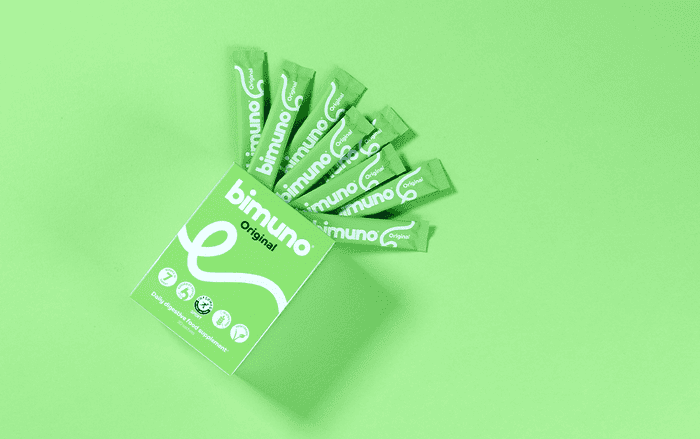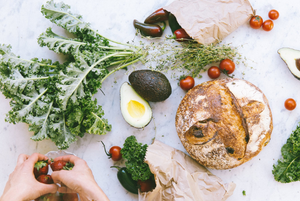
It is no secret that living with IBS can be challenging. It can disrupt your life and leave you feeling confined to your bathroom with enough loo roll to get you through a zombie apocalypse.
Around 1 in 7 people suffer from IBS globally [1], yet it is often poorly understood and difficult to manage. It can be challenging to understand the constant distraction caused by heightened awareness of every minor ache or rumble in the gut, or the embarrassment of avoiding social gatherings out of fear that you’ll turn everyday interactions into a game of chance.
While there is no known ‘cure’ for IBS, there are strategies to manage and support tummy problems. As gut enthusiasts, we’re here to support you on your gut health journey. Below, we’ve listed our top 5 tips for keeping a calm tummy - from dietary changes to stress management techniques, these practical tips will help you take control of your gut health and minimise discomfort.
Tip 1: Find ways to relax

I know, I know, this is easier said than done.
Anxiety and IBS are like the chicken and egg, no one knows which came first. It’s ten minutes before an important meeting or you’re in line at Subway about to be asked whether you want Hearty Italian or cheese and herb, and as trivial as it sounds to some people, if you need to go, you need to go.
The intricate connection between your mind and gut creates a relentless cycle: stressing over potential flare-ups can trigger rumblings, leading to increased anxiety about managing symptoms when out and about. It's essential to maintain a balance between your gut health and mood, as taking care of one could positively affect the other.
Engaging in activities you love, such as listening to music, reading a graphic novel, or binge-watching your favourite TV series, can help soothe your nervous system and lower stress levels.
Tip 2: Keep a nutrition journal

Imagine having a tool that allows you to uncover patterns between what you eat and how you feel. That’s precisely what a nutrition journal offers.
This may seem like a mundane task, but by jotting down everything you consume throughout the day and noting any associated symptoms, you create a roadmap that reveals how different foods impact your digestive system and can gradually start to minimise them from your diet. Then you can start asking questions - Is dairy right for you? Do too many pornstar martinis leave you running from the dance floor?
Thankfully, there's a wide range of user-friendly and informative IBS apps available, making it simple to monitor your nutrition and identify dietary triggers for flare-ups. If you prefer tracking your nutrition on your phone, explore our list of the Top 5 Apps for IBS & Digestive Health.
Tip 3: Cut back on the caffeine

If you are a devout tea or coffee drinker, then it can be all too tempting to overlook this tip.
Sometimes it feels like a copious amount of caffeine is the only way you’ll make it through your 9-5 job or those three-hour-long university lectures.
However, caffeine is a natural stimulant that can heighten bowel sensitivity and increase gut motility[2]. As we know, IBS and emotions can be closely connected and adding caffeine to the mix may further heighten stress by increasing your heart rate and feelings of nervousness or anxiety [3].
Consider exploring alternatives such as herbal teas, decaf coffee, or fruit-infused water to reduce your caffeine intake while still enjoying a flavourful beverage.
Tip 4: Add more exercise into your daily routine

Exercise isn’t just about shedding pounds or sculpting muscles. It is a powerful tool for calming both your gut and your mind.
Regular physical activity can help to regulate bowel movements, alleviate bloating, and reduce stress levels. It increases serotonin levels and releases feel-good endorphins, leaving you feeling energised and empowered to take on the day [4].
Tip 5: Incorporate Prebiotics

Prebiotics feed the ‘good bacteria’ that live in the gut. They can be found naturally in certain foods, such as:
onion
garlic
leeks
Asparagus
oats
whole grains
and more!
By stimulating these beneficial bacteria, prebiotics can help to rebalance the gut microbiome, a complex community of microorganisms that reside in the gut and play a vital role in health. While a healthy lifestyle and balanced diet should be your first port of call, a prebiotic supplement may be an easy but effective way of further supporting your gut health.
If you’re looking for that extra gut support, try Bimuno® Original, our high-in-fibre prebiotic supplement that has been scientifically proven to feed and stimulate the growth of good bacteria in the gut.

Related Articles








